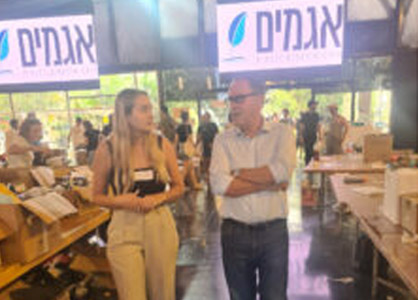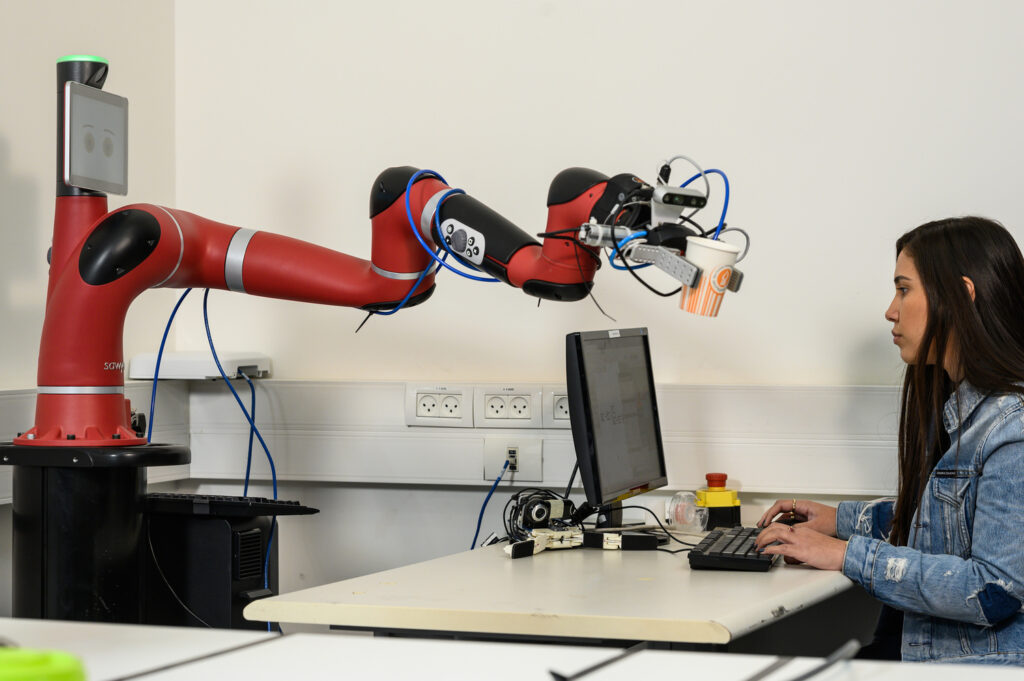
New Jersey Native Rallies Beer-Sheva Neighborhoods to “Go Green”
New Jersey Native Rallies Beer-Sheva Neighborhoods to “Go Green”
February 18, 2009
Desert & Water Research, Negev Development & Community Programs
Isaac Hametz made aliya to the Israeli community of Beer-Sheva more than two years ago as a passionate Zionist filled with youthful idealism.
“It was my dream and vision to go to Israel,” said the 25-year-old Hametz, who grew up in Edison and holds a degree in agricultural science and technology from the University of Maryland.
So shortly after graduation in 2006 he married and moved with his wife, Talia Levy, to Israel to pursue their dreams.
“We moved directly to Beer-Sheva because we felt we were following in David Ben-Gurion’s dream in that he believed Beer-Sheva and the Negev was the future of Israel,” said Hametz. “The region is historically important. It is the last of Israel’s great land reserves.”
Settling in the aging and poor Gimmel neighborhood while Levy attended Ben-Gurion University of the Negev’s Medical School for International Health (MSIH), the couple realized that many of their neighbors were disconnected from society. Moreover, the city contained an absorption center whose Ethiopian immigrants were lost in Western culture.
“I saw there was very little given to these lower-income and older neighborhoods,” Hametz told NJJN during a recent visit to New Jersey.
“So I decided to found a nonprofit to improve the quality of life and the quality of the environment. We use the environment as a rallying point to help build communities.”
That nonprofit organization, Shvuat ha-Adamah, or Earth’s Promise, seeks to create and adapt locally sustainable solutions to everyday environmental and communal challenges, reduce pollution and energy use, and reconnect the Ethiopians to their agrarian roots while improving Israel’s economy and the quality of life for its people.
“We identified the Ethiopians as being particularly affected by the polarization of wealth,” said Hametz. “As Jews from North America, we had this idea that we should all take care of our brothers and sisters. When I saw this incredibly stark contrast it horrified me and really lit a spark in me to work for a more socially just Israeli society. It just broke my heart.”
“Recycling and the environment are really such Jewish issues,” said Hametz. “There is the concept of bal tash’hit, not wasting anything. We have Tu B’Shevat, the New Year of the Trees — Judaism’s Earth Day — and almost all agricultural holidays are connected to the agricultural seasons.”
Hametz, a graduate of Rabbi Pesach Raymon Yeshiva in Edison, was in the United States recently to visit his parents, Irwin and Denise Hametz of Edison, and to raise funds for the organization, where he donates about 60 hours of time weekly as its executive director.
“We deal with the communities to identify local environmental problems not being taken care of by the municipality,” said Hametz. “We’re working with the community to create grassroots models of sustainability.”
He noted that 90 percent of Israel’s population currently lives in urban areas and disproportionately uses more resources and creates higher levels of pollution; Earth’s Promise hopes to harness “the cultural will” of those citizens to bring about change.
In the case of Beer-Sheva, the area includes a lot of open, neglected land on which the Ethiopians can be taught modern agricultural techniques while growing some of their own food.
A quarter-acre of such land is now a thriving community garden.
“We took this challenge and turned it into an asset,” said Hametz. He said that because most of Earth’s Promise’s staff is volunteer, its overhead is low. Its board is a mixture of well-known professionals, local lay leaders, and “rising young stars.”
Students from local schools and Ben-Gurion University are among the volunteers, and several Knesset members showed up at the opening ceremony for the community garden about six months ago. The deputy mayor handled the ribbon-cutting duties.
“After that we put up our fence and brought in organic fertilizer,” said Hametz. “We installed drip irrigation so the Ethiopians could learn how to use modern technology, and we have a professional that comes and works with the community.”
The organization runs educational workshops, where adults are taught other job skills such as landscaping and construction. It is working with the Rambam Synagogue to “green” the shul, including setting up organic composting through which more than five tons of organic waste was recycled last year.
Another program seeks to spread awareness about protecting the environment by creating “compost hot spots” to serve as mini-recycling centers and to engage the community. “For example I have six of my neighbors bring their recycling to me, and I recycle it,” explained Hametz. “This creates a relationship with my neighbors to discuss environmental issues.”



